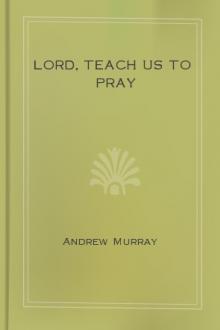Where No Fear Was - Arthur Christopher Benson (best books to read for self improvement .TXT) 📗

- Author: Arthur Christopher Benson
Book online «Where No Fear Was - Arthur Christopher Benson (best books to read for self improvement .TXT) 📗». Author Arthur Christopher Benson
CONTENTS
I. THE SHADOW
II. SHAPES OF FEAR
III. THE DARKEST DOUBT
IV. VULNERABILITY
V. THE USE OF FEAR
VI. FEARS OF CHILDHOOD
VII. FEARS OF BOYHOOD
VIII. FEARS OF YOUTH
IX. FEARS OF MIDDLE AGE
X. FEARS OF AGE
XI. DR. JOHNSON
XII. TENNYSON, RUSKIN, CARLYLE
XIII. CHARLOTTE BRONTE
XIV. JOHN STERLING
XV. INSTINCTIVE FEAR
XVI. FEAR OF LIFE
XVII. SIMPLICITY
XVIII. AFFECTION
XIX. SIN
XX. SERENITY
"Thus they went on till they came to about the middle of the Valley, and then Christiana said, 'Methinks I see something yonder on the road before us, a thing of such a shape such as I have not seen.' Then said Joseph, 'Mother, what is it?' 'An ugly thing, Child, an ugly thing,' said she. 'But, Mother, what is it like?' said he. ''Tis like I cannot tell what,' said she. And now it was but a little way off. Then said she, 'It is nigh.'"
"Pilgrim's Progress," Part II.
I
THE SHADOW
There surely may come a time for each of us, if we have lived with any animation or interest, if we have had any constant or even fitful desire to penetrate and grasp the significance of the strange adventure of life, a time, I say, when we may look back a little, not sentimentally or with any hope of making out an impressive case for ourselves, and interrogate the memory as to what have been the most real, vivid, and intense things that have befallen us by the way. We may try to separate the momentous from the trivial, and the important from the unimportant; to discern where and how and when we might have acted differently; to see and to say what has really mattered, what has made a deep mark on our spirit; what has hampered or wounded or maimed us. Because one of the strangest things about life seems to be our incapacity to decide beforehand, or even at the time, where the real and fruitful joys, and where the dark dangers and distresses lie. The things that at certain times filled all one's mind, kindled hope and aim, seemed so infinitely desirable, so necessary to happiness, have faded, many of them, into the lightest and most worthless of husks and phantoms, like the withered flowers that we find sometimes shut in the pages of our old books, and cannot even remember of what glowing and emotional moment they were the record!
How impossible it is ever to learn anything by being told it! How necessary it is to pay the full price for any knowledge worth having! The anxious father, the tearful mother, may warn the little boy before he goes to school of the dangers that await him. He does not understand, he does not attend, he is looking at the pattern of the carpet, and wondering for the hundredth time whether the oddly-shaped blue thing which appears and reappears at intervals is a bird or a flower--yes, it is certainly meant for a bird perched on a bough! He wishes the talk were over, he looks at the little scar on his father's hand, and remembers that he has been told that he cut it in a cucumber-frame when he was a boy. And then, long afterwards perhaps, when he has made a mistake and is suffering for it, he sees that it was THAT of which they spoke, and wonders that they could not have explained it better.
And this is so all along! We cannot recognise the dark tower, to which in the story Childe Roland came, by any description. We must go there ourselves; and not till we feel the teeth of the trap biting into us, do we see that it was exactly in such a place that we had been warned that it would be laid.
There is an episode in that strange and beautiful book Phantastes, by George Macdonald, which comes often to my mind. The boy is wandering in the enchanted forest, and he is told to avoid the house where the Daughter of the Ogre lives. His morose young guide shows him where the paths divide, and he takes the one indicated to him with a sense of misgiving.
A little while before he had been deceived by the Alder-maiden, and had given her his love in error. This has taken some of the old joy out of his heart, but he has made his escape from her, and thinks he has learned his lesson.
But he comes at last to the long low house in the clearing; he finds within it an ancient woman reading out of an old volume; he enters, he examines the room in which she sits, and yielding to curiosity, he opens the door of the great cupboard in the corner, in spite of a muttered warning. He thinks, on first opening it, that it is just a dark cupboard; but he sees with a shock of surprise that he is looking into a long dark passage, which leads out, far away from where he stands, into the starlit night. Then a figure, which seems to have been running from a long distance, turns the corner, and comes speeding down towards him. He has not time to close the door, but stands aside to let it pass; it passes, and slips behind him; and soon he sees that it is a shadow of himself, which has fallen on the floor at his feet. He asks what has happened, and then the old woman says that he has found his shadow, a thing which happens to many people; and then for the first time she raises her head and looks at him, and he sees that her mouth is full of long white teeth; he knows where he is at last, and stumbles out, with the dark shadow at his heels, which is to haunt him so miserably for many a sad day.
That is a very fine and true similitude of what befalls many men and women. They go astray, they give up some precious thing--their innocence perhaps--to a deluding temptation. They are delivered for a time; and then a little while after they find their shadow, which no tears or anguish of regret can take away, till the healing of life and work and purpose annuls it. Neither is it always annulled, even in length of days.
But it is a paltry and inglorious mistake to let the shadow have its disheartening will of us. It is only a shadow, after all! And if we capitulate after our first disastrous encounter, it does not mean that we shall be for ever vanquished, though it means perhaps a long and dreary waste of shame-stained days. That is what we must try to avoid--any WASTE of time and strength. For if anything is certain, it is that we have all to fight until we conquer, and the sooner we take up the dropped sword again the better.
And we have also to learn that no one can help us except ourselves. Other people can sympathise and console, try to soothe our injured vanity, try to persuade us that the dangers and disasters ahead are not so dreadful as they appear to be, and that the mistakes we have made are not irreparable. But no one can remove danger or regret from us, or relieve us of the necessity of facing our own troubles; the most that they can do, indeed, is to encourage us to try again.
But we cannot hope to change the conditions of life; and one of its conditions is, as I have said, that we cannot foresee dangers. No matter how vividly they are described to us, no matter how eagerly those who love us try to warn us of peril, we cannot escape. For that is the essence of life--experience; and though we cannot rejoice when we are in the grip of it, and when we cannot see what the end will be, we can at least say to ourselves again and again, "this is at all events reality--this is business!" for it is the moments of endurance and energy and action which after all justify us in living, and not the pleasant spaces where we saunter among flowers and sunlit woods. Those are conceded to us, to tempt us to live, to make us desire to remain in the world; and we need not be afraid to take them, to use them, to enjoy them; because all things alike help to make us what we are.
II
SHAPES OF FEAR
Now as I look back a little, I see that some of my worst experiences have not hurt or injured me at all. I do not claim more than my share of troubles, but "I have had trouble enough for one," as Browning says,--bereavements, disappointments, the illness of those I have loved, illness of my own, quarrels, misunderstandings, enmities, angers, disapprovals, losses; I have made bad mistakes, I have failed in my duty, I have done many things that I regret, I have been unreasonable, unkind, selfish. Many of these things have hurt and wounded me, have brought me into sorrow, and even into despair. But I do not feel that any of them have really injured me, and some of them have already benefited me. I have learned to be a little more patient and diligent, and I have discovered that there are certain things that I must at all costs avoid.
But there is one thing which seems to me to have always and invariably hampered and maimed me, whenever I have yielded to it, and I have often yielded to it; and that is Fear. It can be called by many names, and all of them ugly names--anxiety, timidity, moral cowardice. I can never trace the smallest good in having given way to it. It has been from my earliest days the Shadow; and I think it is the shadow in the lives of many men and women. I want in this book to track it, if I can, to its lair, to see what it is, where its awful power lies, and what, if anything, one can do to resist it. It seems the most unreal thing in the world, when one is on the other side of it; and yet face to face with it, it has a strength, a poignancy, a paralysing power, which makes it seem like a personal and specific ill-will, issuing in a sort of dreadful enchantment or spell, which renders it impossible to withstand. Yet, strange to say, it has not exercised its power in the few occasions in my life when it would seem to have been really justified. Let me quote an instance or two which will illustrate what I mean.
I was confronted once with the necessity of a small surgical operation, quite unexpectedly. If I had known beforehand that it was to be done, I should have depicted every incident with horror and misery. But the moment arrived, and I found myself marching to my bedroom with a surgeon and a nurse, with a sense almost of amusement at the adventure.
I was called upon once in Switzerland to assist with two guides in the rescue of an unfortunate woman who had fallen from a precipice, and had to be brought down, dead or alive. We hurried up through the pine-forest with a chair, and found the poor





Comments (0)